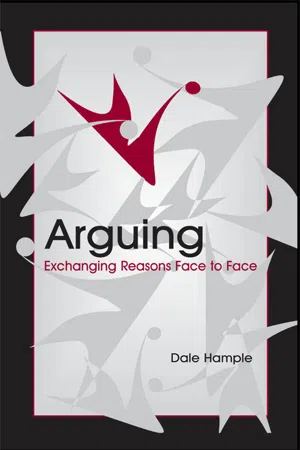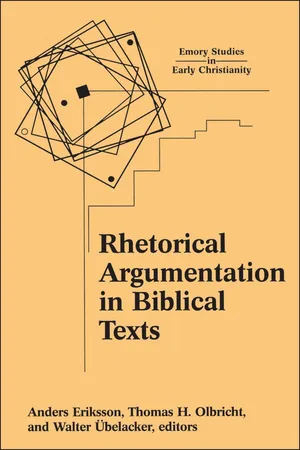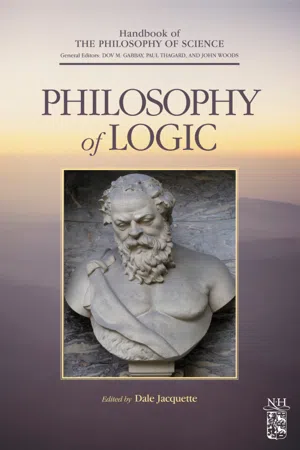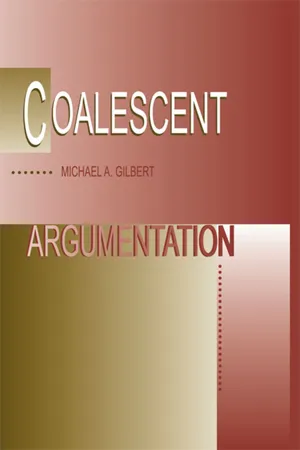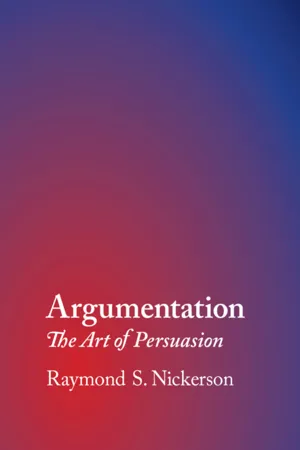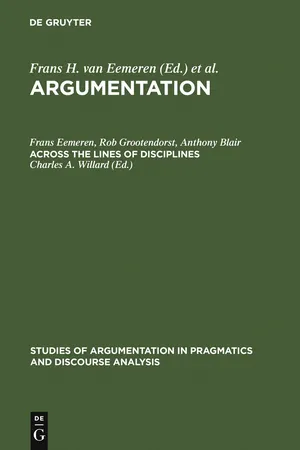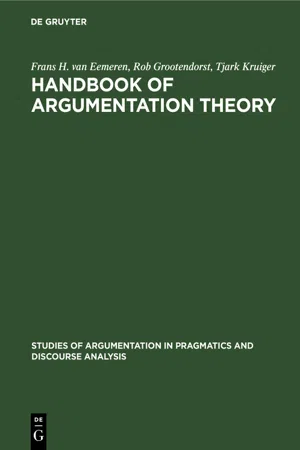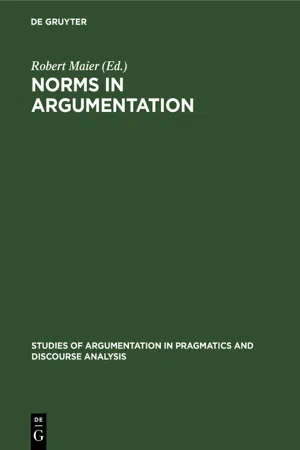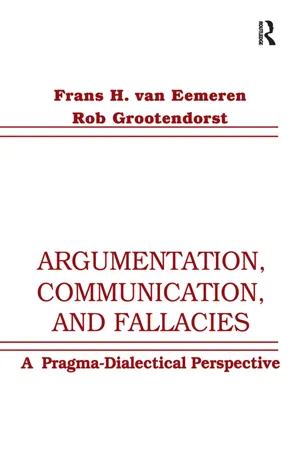Languages & Linguistics
Argumentation
Argumentation refers to the process of presenting and defending a position or viewpoint through logical reasoning and evidence. In the context of languages and linguistics, argumentation involves analyzing and constructing persuasive arguments related to language use, structure, and meaning. It encompasses the study of rhetoric, persuasion, and the effective communication of ideas within the field of linguistics.
Written by Perlego with AI-assistance
Related key terms
1 of 5
12 Key excerpts on "Argumentation"
- eBook - ePub
Arguing
Exchanging Reasons Face to Face
- Dale Hample(Author)
- 2006(Publication Date)
- Routledge(Publisher)
Chapter 1: Definition of Argument An argument is a conclusion supported by a reason. Normally, the conclusion is something that is controversial (or at least not obvious) before the argument is absorbed. Consequently, some element of the reason—the part normally called the evidence or the data—should be immediately acceptable. That way, the argument moves from the known to the unknown, or from the taken-for-granted to the doubtful. Arguing is something that can only be done by people. Paragraphs do not argue, and neither do propositions. Arguing is a fundamental human activity, perhaps the primary means of coming to new understandings. Argumentation began its academic life as a part of rhetoric and did not really take on any distinct academic identity until the final decades of the 20th century. Consequently, its heritage and definitions derive from several ancient traditions. One of these is rhetoric, of course, but its contributions are intertwined with those of the other disciplines. Dialectic is an important contributory literature. For Aristotle, rhetoric was an offshoot of dialectic (Rhetoric, 1354a). This remark has been the subject of much discussion. Dialectic is a mode of philosophical inquiry, in which (prototypically) two people try to work out the solution to a deep problem—for instance, what is the nature of justice? Although each dialectician may begin with a point of view, once a position is expressed, neither person advocates. Instead, each interlocutor takes the standpoint as something to be tested argumentatively. Definitions are exposed and tested, evidence is sought, and all reasoning is explicit and available for criticism. Nothing personal is supposed to be involved, so the parties’ status, reputations, prior commitments, and other attributes are set aside. Knowledge is shared, rather than being husbanded as a rhetorical resource - eBook - PDF
Rhetorical Argumentation in Biblical Texts
Essays from the Lund 2000 Conference
- Anders Eriksson, Thomas H. Olbricht, Walter Übelacker(Authors)
- 2002(Publication Date)
- Trinity Press International(Publisher)
PART ONE RHETORICAL Argumentation AND METHOD This page intentionally left blank CHAPTER 1 Argumentation THEORY: AN OVERVIEW OF APPROACHES AND RESEARCH THEMES Frans H. van Eemeren Subject-Matter and Aims of the Study of Argumentation We can describe the subject matter of the study of Argumentation in the following way: Argumentation is a verbal, social and rational activity aimed at convincing a reason-able critic of the (in)acceptability of a standpoint by advancing a certain constellation of propositions which is designed to justify (or refute) the standpoint. This definition does justice to the process-product ambiguity inherent in the word Argumentation: it not only refers to the activity of advancing reasons but also to the shorter or longer oral or written text that results from it. The study of Argumentation concentrates on the analysis, evaluation, and presentation of the point of departure and the organization of argumen-tation. The point of departure consists of all explicit and implicit premises and assumptions that are taken as the starting point in Argumentation. The organization of the Argumentation comprises the way in which the various reasons are connected with each other and the standpoint at issue to justify or refute this standpoint. In the study of the point of departure and the organization of argumen-tation both logical and pragmatic considerations play a part. Logicians are not generally concerned with Argumentation as it is put forward in nat-ural circumstances by somebody who attempts to convince someone else of a certain standpoint, but with abstract argument forms or patterns of rea-soning in which a conclusion is derived from a particular set of formalized premises with the help of various sorts of logical constants. - eBook - PDF
- Dov M. Gabbay, Paul Thagard, John Woods(Authors)
- 2006(Publication Date)
- North Holland(Publisher)
What is crucial is that the addressee make the mental inference that corresponds to the move in the argument from premisses to conclusion. Thus “arguments are invitations to inference” [Pinto, 2001b, 37]. This conception of 118 David Hitchcock argument has been central to the development of the definition proposed in this chapter. But Pinto’s conception differs from the present definition in that it treats arguments as products with a particular purpose (to get the addressee to accept the conclusion) rather than as abstract objects that might be used for various purposes. Ralph Johnson proposes the following definition: An argument is a type of discourse or text — the distillate of the practice of Argumentation — in which the arguer seeks to persuade the Other(s) of the truth of a thesis by producing the reasons that support it. In addition to this illative core, an argument possesses a dialectical tier in which the arguer discharges his dialectical obligations. [Johnson, 2000, 168] The practice of Argumentation to which Johnson refers in this definition he defines as “the sociocultural activity of constructing, presenting, interpreting, criticizing, and revising arguments.” [Johnson, 2000, 12, 154] The present author has argued, and Johnson has apparently accepted [Johnson, 2002, 313], that his intention is best captured by adding to this definition of the practice the qualifying phrase “for the purpose of reaching a rationally shared position on some issue” [Hitchcock, 2002, 291]. Further, to avoid the circularity of defining arguments in terms of Argumentation and Argumentation in terms of arguments, Johnson must recognize explicitly in his definition of argument (as he does implicitly elsewhere in his book) that arguments occur in contexts other than that of Argumentation. - eBook - ePub
- Michael A. Gilbert(Author)
- 2013(Publication Date)
- Routledge(Publisher)
Wenzel offered several further distinctions when, in 1980, he allowed for three separate perspectives on argument. The first, the traditional category of argument as object, e.g., a syllogism, he termed ‘product.’ The second, ‘procedure,’ encompassed the rhetorical skills and insights accumulated over the ages. From the point of view of procedure, argument is something that can be analyzed for its persuasive impact and its use of rhetorical technique. ‘Process’ was the term that described what is often called ‘dialectic’: two individuals using critical rationality to investigate or determine the truth. Many of the problems plaguing Argumentation Theory, he claimed, were a result of attempting to find one all encompassing approach for three distinct endeavors.What was most significant about these writings was their integration of logical and Argumentation concepts that went beyond the traditional categories in Communication Theory. They witnessed an awareness of a growth toward the investigation of dialogic Argumentation while at the same time holding onto the basal concepts of rhetorical and speech studies. It was, after all, not only philosophy that had concentrated on the static argument, but rhetoric as well. Concern with the analysis of public speeches was to be replaced by a focus on the interaction undertaken by people in disagreement. This required new concepts and distinctions, such as argumenti and argument2, that would permit the scholar to differentiate between different concerns.One major influence on Argumentation Theory and, indeed, Communication Theory in general has been the Social Constructvitist approach. Willard, in a 1978 article entitled, “A Reformulation of the Concept of Argument: The Construc- tivist/Interactionist Foundations of a Sociology of Argument,” utilizes Personal Construct Theory and Chicago School Interactionism to define argument “as a specific kind of social relationship or encounter” (p.121). More particularly, “argument is a kind of interaction in which people maintain what they construe to be mutually exclusive propositions” (p.125, emph. orig.). This approach, popular in Communication Theory, meant that Argumentation Theory had a descriptive role as well as its traditionally normative function. In order to understand argument, we must begin with arguers. - eBook - PDF
Argumentation
The Art of Persuasion
- Raymond S. Nickerson(Author)
- 2020(Publication Date)
- Cambridge University Press(Publisher)
1 Argumentation The domain of Argumentation is that of the credible, the plausible, the probable, to the degree that the latter eludes the certainty of calculations (Perelman & Olbrechts-Tyteca, 1969, p. 1). In philosophy, we spend half our time arguing that our opponent’s arguments are fallacious. No philosophers admit to being equivoca- tors, but all philosophers agree that the other philosophers are equi- vocating. Exactly where the equivocations are is part of what everybody argues about” (Powers, 1995, p. 300). It would be difficult to overstate the importance of the role that Argumentation has played in the history of humankind. Arguments are used to determine who will rule a nation and how a nation will be ruled. They are used to decide on the guilt or innocence of people accused of criminal behavior. Philosophers use them to justify or challenge world views. Academics use them to shape the thinking of their students regard- ing whatever they are teaching. Merchants use them to influence people’s purchasing behavior. Parents use them to convince their offspring to behave, or not, in certain ways, and the offspring use them in the hope of showing their parents’ arguments to be flawed. What is an Argument? In everyday language argument often connotes a verbal dispute or quarrel and arguing successfully is likely to be equated with getting the better of one’s opponents in such interactions. The winning of verbal disputes requires ability in case building, which sometimes means marshaling evidence favoring a particular position while ignoring, discounting, or contesting evidence that opposes it. A more philosophical or idealistic connotation of the term would be an impartially reasoned support of 1 a conclusion; from this perspective, to reason well argumentatively means to judge evidence on its merits and to reach conclusions that unbiased inferential use of evidence supports. - eBook - PDF
- Frans H. van Eemeren, Rob Grootendorst, J. Anthony Blair, Charles A. Willard, Frans H. van Eemeren, Rob Grootendorst, J. Anthony Blair, Charles A. Willard(Authors)
- 2011(Publication Date)
- De Gruyter Mouton(Publisher)
Chapter 16 The Function of Argumentation: A Pragmatic Approach Josef Kopperschmidt Argumentation has, without doubt, become a subject of scholarly interest. Nonetheless, there is no one particular discipline that includes a specific area of reflection for this subject. There is also no definitive paradigm (Th.S. Kuhn), within which this subject can be theoretically conceptualized and structurally categorized, so that one can speak of a relatively structured problem area. In such a situation, it is perhaps best, first of all, to reflect on and to test strategic approaches to this still unstructured problem area of Argumentation. My contribution to this is an attempt to sketch a possible approach to the problem through an explanation of the pragmatic function of Argumentation and from this to try to structure the problem area of Argumentation into a system of categories. The thesis on which I am basing this pragmatic attempt at explaining the problem is as follows: Argumentation ensures the communicative conditions for existence of people, living in a society and dependent on cooperation, if the coordination of actions no longer can be based on common view of world and if a shift to mechanisms for such coordination, which is independent of understanding, has not yet functioned and perhaps, in principle, never will. I am going to try to explain this thesis in six steps. 1. Methodically, the starting point for an explanation of the pragmatic function of Argumentation is the question, 'what is actually the purpose of arguments?' An obvious answer could be that arguments master - as does each kind of communicative language usage - a particular situation. Still, what kind of a situation are we talking about here? Quintilian states in his Institutio Oratorio, in the chapter 'De arguments' (V 9.1): 'argumento autem nisi in re controversia locus esse non potest or in other words: 'arguments are only necessary, when affairs are disputable or are becoming so'. - eBook - PDF
Handbook of Argumentation Theory
A Critical Survey of Classical Backgrounds and Modern Studies
- Frans H. van Eemeren, Rob Grootendorst, Tjark Kruiger(Authors)
- 2019(Publication Date)
- De Gruyter Mouton(Publisher)
Chapter 3 Major Studies on Argumentation 3.1. Contributions to the development of the study of Argumentation In chapter 2 we looked at some of the backgrounds to the study of Argumentation: classical logic, dialectic and rhetoric, the study of fallacies, and modern logic. To the Argumentation theorist the work which has been and is being done in these fields is of particular inter-est because its purpose is to find a solution to problems which also face the Argumentation theorist himself. In many cases research into logic is an important substratum for activity in Argumentation theory, and in some cases there may indeed be no clearly discernible boundary between the two. This becomes clear when we discuss the most important contributions to the development of argu-mentation theory as a field of study. During the nineteen-fifties the study of reasoning in colloquial language underwent certain developments which shaped the face of the field of Argumentation theory as we describe it here. Until then the study of Argumentation had been regarded as belonging to the classical tradition, principally rhetoric. The attention paid to reasoning in colloquial language was chiefly oriented along practical lines and found expression mainly in attempts to make rhetorical and logical in-sights applicable to teaching. There was no question of interesting theoretical innovations or an expansion of knowledge of the subject. The revival of the practical interest in Argumentation dates, speaking very generally, from the beginning of the last century. In the United States it was coupled with 108 Contributions to the development of the field 109 a re-evaluation of classical rhetoric. Since the second half of the nineteenth century courses in public speaking and writing have been given at American schools and universities, sometimes combined with courses in listening and reading. - eBook - PDF
Norms in Argumentation
Proceedings of the Conference on Norms 1988
- Robert Maier(Author)
- 2019(Publication Date)
- De Gruyter Mouton(Publisher)
Chapter 4 Natural Logic and Norms in Argumentation 1 Robert Maier 1. Introduction: Is natural logic normative? Argumentation can be conceived as a highly specified form of verbal exchange between two or more participants. Only the forms of verbal exchange which satisfy an impressive set of conditions can qualify as Argumentation. For example, the pragma-dialectical conception of argumen-tation by van Eemeren and Grootendorst (1983) defines such a particular set of conditions for Argumentation. A quite different approach to argu-mentation prevails in the work of Ducrot, Anscombre and others, who see in almost any verbal production an argumentative force and tendency. Natural logic, as developed by J.-B. Grize and his collaborators 2 , is closer to the second approach to Argumentation. It attempts to formulate a theory of the procedures at work in everyday discourse. Following Benveniste, any discourse is conceived as dialogical. As such, everyday discourse takes into account the diverse representations of the partici-pants, and also their goals and desires. Therefore everyday discourse has an argumentative stance, by its adaptation to the practical situation of discourse and its participants. Neither well-organized and formalized theories nor strictly streamlined dialogues constitute the paradigmatic reference for natural logic. Rejecting any limitative definition of Argumentation, natural logic strives to elucidate the argumentative features of a diversity of common discourses such as advertisements and political speeches. Natural logic appears already as an extremely productive research program, but nevertheless, it presents itself as a starting quest, as a venture which will only in the future formulate a theory of Argumentation. - eBook - ePub
Argumentation, Communication, and Fallacies
A Pragma-dialectical Perspective
- Frans H. van Eemeren, Rob Grootendorst(Authors)
- 2016(Publication Date)
- Routledge(Publisher)
For that purpose, Argumentation is first put in a communicative perspective (Part I), then the fallacies are discussed that occur when certain rules of communication are violated (Part II). In so doing, a pragma-dialectic alternative is offered to both a linguistically inspired descriptive and a logically inspired normative approach to Argumentation. Part I of the book, “Argumentation and Communication,” provides a theoretical framework for dealing with argumentative discourse. We discuss the speech acts that play a part in a critical discussion aimed at resolving a difference of opinion. The various stages of a critical discussion are distinguished and the communicative and interactional aspects are considered of the speech acts that are performed in resolving simple or more complex disputes. Argumentation is characterized as a complex speech act in the Argumentation stage. In order to make up for the seemingly unworldly ideal of critical discussion, special attention is paid to various real-life complications in dealing with argumentative discourse. Some guidelines are formulated for analyzing indirect speech acts and unexpressed premises and the structural differences are discussed between single, multiple, co-ordinatively compound, and subordinatively compound Argumentation. After having dealt with these crucial aspects of analysis, Part II, “Communication and Fallacies,” links the evaluation of argumentative discourse to its analysis and concentrates on the obstacles to achieving a resolution of a dispute. Making use of the theoretical framework outlined in Part I, we present 10 basic rules for critical discussion - eBook - PDF
Global Linguistics
An Introduction
- Marcel Danesi, Andrea Rocci(Authors)
- 2009(Publication Date)
- De Gruyter Mouton(Publisher)
As in other chapters, however, we can only scratch the surface here as well. The objective is, simply, to delineate the main notions associated with Argumentation theory so as to be able to include them into the broader framework of GL. 2. Discussions: freedom and responsibility If we want to understand how Argumentation works as a form of socialized reasoning it is natural to start from a discussion. A discussion is a form of dialogue in which Argumentation takes place. In fact, all arguments, even those that appear in monological texts, like, for instance, newspaper editorials and opinion pieces, are to be understood – at least implicitly – as interventions in a virtual discussion. We can say that Argumentation theory subscribes to a version of Bakhtin’s dialogical principle, which we introduced in Chapter 2 (§ 2). Let us examine a mini case-study to see what the key components of a discussion are and how Argumentation may unfold from them. Let us suppose that Mary and John are discussing about animal taxonomy, perhaps just after biology class, and Mary advances the following standpoint: Whales are mammals. John is not convinced and casts doubt on the standpoint: No I don’t think so. John’s expression of doubt functions as a challenge to Mary to defend her standpoint. In a reasonable discussion the burden of proof is on whoever advances a standpoint. John, in his turn, may Discussions: freedom and responsibility 175 or may not advance his own standpoint. If he does – for instance by saying I’m pretty sure the whale is a fish – he will have in his turn to support it with arguments. Van Eemeren and Grootendorst (2004) propose that our argumentative discussions can be better understood and evaluated if we compare them against an ideal yardstick, which they call the model of critical discussion. - eBook - ePub
Evaluating the Evaluator
A Novel Perspective on Translation Quality Assessment
- Hansjörg Bittner(Author)
- 2019(Publication Date)
- Routledge(Publisher)
We should emphasise once again that, far from being independent, a decision relates to preceding decisions in that it builds on them, and to later decisions in that it determines their individual scope. The first, second, and third decisions specify the translation strategy, making up the core of the overall decision mechanism. Some decision rules may still emerge during the actual translation process – decision rules that may even cause the translator to readjust the translation strategy; yet, generally, the rules of the translation strategy established in decisions one, two, and three should provide a clear and unchanging guideline for the translator to solve any problems in the actual translation process. Thus, the translation strategy serves as a basis for the justification of individual translation solutions. It also plays a crucial role in the evaluation of translation.The Argumentation Process
An ideal translation would consist of translation solutions that are better than any alternatives found in the respective decision spaces. Thus, it is necessary to show that whatever can be said in favour of a preferred translation solution for a given translation unit is more convincing than what can be said in favour of any other solutions for the same unit. This implies that whatever can be said against a preferred translation solution for a given translation unit should carry less weight than what can be said against any other solutions for the same unit. The translator and the evaluator have to consider the pros and cons for each potential solution of a specific translation problem. To come to a conclusion in this reasoning process, they need arguments that strengthen the preferred solution and arguments that weaken the case for each of the possible alternatives. For the quality of a translation solution is only as good as the arguments supporting it. What is needed, then, is an Argumentation framework that reveals the relative quality of one translation solution in comparison with alternative translation solutions. In looking for a system that can be used to set up such an Argumentation framework, we have come across the theory of dialectical structures by Gregor Betz (2010).11 In this section, we will first give a brief outline of Betz’s theory, before presenting a simplified version for our own purposes.A Theory of Dialectical Structures
In a discussion, according to Betz, any insight into how the exchange of arguments works seems to be based on intuition rather than clear reasoning, as there is no regulatory framework that could be consulted (cf. Betz 2010:4). This is why Betz undertakes to contribute with his theory of dialectical structures to a grammar of reasonable Argumentation (cf. Betz 2010:4). The theory should provide a basis for the analysis and explanation of all kinds of argumentative exchanges. In this context, it is important to see that complex and controversial Argumentation is both structure and process at the same time: Argumentation is viewed as a structure inasmuch as it consists of many elements (theses, justifications, objections, etc.) that are interrelated in a variety of different ways (characterised by expressions such as proving, contradicting, defending, or countering); and Argumentation is viewed as a process, because it emerges and develops as the result of a discussion in which the proponents add one idea or opinion to another (cf. Betz 2010:5). However, while other approaches may tend to be more process-oriented, Betzʼ s theory of dialectical structures (as the name indicates) is at bottom a structural Argumentation theory (cf. Betz 2010:8). This has two advantages: on the one hand, it avoids the problems encountered by the procedural approaches; on the other, it ties in with the requirements of formal logic – formal logic being one of three points of departure for Betz’s theory. The other two are informal logic and theories of defeasible reasoning.12 Combining the advantages of these three logical methods while avoiding their respective disadvantages: that is what Betz tries to achieve with his theory of dialectical structures. Like informal logic theories, Betz’s theory should be able to capture and depict the macrostructure of complex Argumentation; like formal logic, it should make possible a precise and detailed analysis and evaluation of individual arguments by means of deductive reconstruction; like the theories of defeasible reasoning with their Argumentation systems, it should be useful for the normative evaluation of complex real Argumentation.13 - eBook - ePub
New Rhetoric, The
A Treatise on Argumentation
- Chaïm Perelman, L. Olbrechts-Tyteca, Lucie Olbrechts-Tyteca(Authors)
- 1991(Publication Date)
- University of Notre Dame Press(Publisher)
PART ONEThe Framework of Argumentation
Passage contains an image
§ 1. Demonstration and ArgumentationThe special characteristics of Argumentation and the problems inherent to its study cannot be better conveyed than by contrasting Argumentation with the classical concept of demonstration and, more particularly, with formal logic which is limited to the examination of demonstrative methods of proof.In modern logic, the product of reflection on mathematical reasoning, the formal systems are no longer related to any rational evidence whatever. The logician is free to elaborate as he pleases the artificial language of the system he is building, free to fix the symbols and combinations of symbols that may be used. It is for him to decide which are the axioms, that is, the expressions considered without proof as valid in his system, and to say which are the rules of transformation he introduces which will make it possible to deduce, from the valid expressions, other expressions of equal validity in the system. The only obligation resting on the builder of formal axiomatic systems, the one which gives the demonstrations their compelling force, is that of choosing symbols and rules in such a way as to avoid doubt and ambiguity. It must be possible, without hesitation, even mechanically, to establish whether a sequence of symbols is admitted in the system, whether it is of the same form as another sequence of symbols, whether it is considered valid, because it is an axiom or an expression deducible from the axioms, in a manner consistent with the rules of deduction. Any consideration that has to do with the origin of the axioms or the rules of deduction, with the role that the axiomatic system is deemed to play in the elaboration of thought, is foreign to logic conceived in this manner, in the sense that it goes beyond the framework of the formalism in question. The search for unquestionable univocity has even led the formalistic logicians to construct systems in which no attention is paid to the meaning of the expressions: they are satisfied if the symbols introduced and the transformations concerning them are beyond discussion. They leave the interpretation of the elements of the axiomatic system to those who will apply it and who will have to concern themselves with its adequacy for the end pursued.
Index pages curate the most relevant extracts from our library of academic textbooks. They’ve been created using an in-house natural language model (NLM), each adding context and meaning to key research topics.
